Rexach Lab
From time to time, we'll profile a Department of Neurology lab and the important work it's doing in the field. Today we're highlighting the work of Dr. Jessica Rexach and her team...
"I am a firm believer in the scientific method and I believe progress in science is made as a team. Rubbing elbows with other talented people and working together enables us to cultivate each other’s talents. I'm exceptionally happy to be where I am because I get to do all of those things." - Jessica Rexach
Lab Mission Statement: New therapeutic targets are needed for neurodegenerative disease including Alzheimer’s and related dementias. The immune system includes many of the most successful therapeutic targets in medicine. My lab seeks to uncover mechanisms by which glia and immune factors influence disease pathology in dementia to inform novel therapeutic strategies.
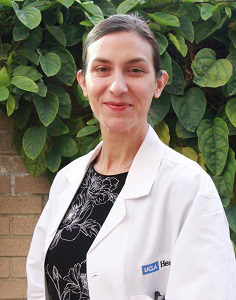
Dr. Jessica Rexach
Position: Assistant Professor of Neurology Program: Neurogenetics
Graduate School: UCLA/Caltech
Postdoc: UCLA
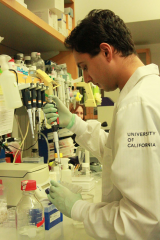
Could you tell me about your lab?
REXACH: Our lab uses systems biology and functional genomics approaches to understand neurodegenerative dementias, such as Alzheimer's disease, frontotemporal dementia, and progressive supranuclear palsy. Our lab takes a comprehensive approach anchored on a few key ideas. First, that these diseases result from the interaction of multiple cell types and we need to appreciate all the different cell types when modeling disease. Beyond that, we must also understand that these disorders change with time. We must appreciate this biological complexity in the work that we design. The use of bioinformatics and computational analyses can help to reduce that information down enough to make it tractable, and identify potential causal drivers of disease biology. We then use cell and animal lab models to test these hypotheses. It's important to me to not just focus on the informatics, but also the biological experiments to inform discovery.
What were the key findings from your most recent research paper?
REXACH: I came into this field as an experimentalist and took a bold move to switch to computational science in my fellowship. I figured out how to take advantage of computational science and systems biology to inform scientific hypotheses, and perform proof of concept experimental validation as a starting point to detailed study. What is really interesting looking back now is that when I started, very little was known about microglia in disease. Microglia are an immune cell in the brain. What we achieved with this work is a detailed description of microglia transitions across disease progression. We discovered that there is a strong component of immune suppression beginning at very early disease stages in these dementias. We also discovered that dementia genes land in the biological pathways that are classically part of viral defense. Doing this work completely changed my thinking about what's going on in these disorders and it's been nice to see as time goes on other experimental studies supporting the predictions that were made in this paper.
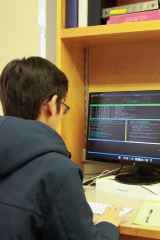
What happens next?
REXACH: We are still pouring the foundation for my lab. We have generated a lot of data sets and set up this infrastructure for future work, but we've only dipped our toes into the discovery phase. We're going to keep pushing in this direction—contributing to this goal of using data to establish an unbiased mechanistic understanding of neurodegeneration and inform therapeutic discovery.
What would be the best case scenario for this research?
REXACH: We follow the science and of course, we don’t know where it will lead until we get there. The integrity of our work is always our first responsibility. But our hope; our best case scenario, is that the work will open up doors to effective therapies that otherwise would have stayed closed.
What do you think is the most exciting aspect of neurological research?
REXACH: When I was a neurology resident [physician in training], I could have taken my career in many different directions, but what ultimately kept me in the neurological sciences was the convergence of unmet needs and the emerging technologies to finally be able to meet those needs. I don't have any doubt that we will see major advances in this field and be able to offer patients revolutionary treatments by the time I retire if we keep pushing forward.
In the 1980’s, when I was a kid, very little was understood about Alzheimer’s disease—no one really knew what it was and the research was underfunded. Suddenly we realized that this disease would impact large groups of people, yet there would be no therapeutic option for them. That’s when people started to invest real money into this field and the research community stepped up. If you look backwards five years ago compared to where we are now, it's a whole other stratosphere. The quality of work that's being done and the kinds of insights that are being achieved now are just unbelievable.
I am also inspired to look back and appreciate the unbelievable progress in medicine achieved because humans decided to invest in it and in the scientific method. Human beings have the capacity to solve any problem if we put collective effort into it and work with integrity. As our species starts to deal with all these new problems and challenges we face, it is important not to forget what we are capable of.
What do you anticipate to be the most significant advancement in neurological research and care in the next ten years?
REXACH: I anticipate that we will see precision medicine [the focus of therapies on specific patients using genetic or molecular profiling] being realized more and more concretely in our practices– not just to provide better interventions but to avoid using the wrong ones for the wrong patients. I can imagine a near future where we will be able to better optimize care for individual patients, providing them the most effective treatment based on their genetic makeup and complete medical history.
The other recent advance with great potential impact is gene therapy. It is already underway and we stand in front of major technological advances already. As a physician scientist, I am excited and hopeful that these future advancements in gene therapy will allow me to better help my patients in the future, especially those with Mendelian genetic disorders [disorders due to a clearly identifiable single gene defect].
What drew you towards R25 (NIH research education program for fellows and residents) as compared to other mechanisms of research?
REXACH: When you have the R25, you establish your research project and mentor during your residency and then you have a very clear trajectory and plan going into fellowship. You can design your fellowship knowing that you have that funding. Having funding for research enables you to set your training plan toward that path to independence from the very start.
Our R25 has been organized by Dr. Carmichael, who at that time I started wasn't the chair of the department, but a real icon and exemplary physician scientist. My decision was also in part due to the positive example of great faculty who preceded me in the R25 and went on to great success.
The R25 was a great match for me. There are many objective benefits – funding, a direct relationship with NINDS, a direct mechanism for excellent faculty mentorship—and a flexible program to shape my fellowship. And the more subjective benefits were just as important for me—it gave me a clear way to define myself and my trajectory, and a way to keep my mind in research mode during my clinical training. This was crucial for me.
Dr. Rexach refers to her team in the lab as her “dream team”. Here’s some insight from a few of them…
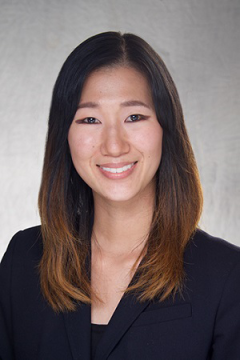
Marie Kim
Resident Physician
What drew you to R25 as compared to other mechanisms of research?
KIM: There are many paths that you can take in medicine. I always knew I wanted to do an academic research path. One of the benefits of doing an R25 is that it is an NIH funding mechanism. For lack of a better term, the highest status funding is through the NIH. It's interesting because it's not necessarily the most money, but there are very strict criteria in place to get NIH funding. So if you have this reputation of being able to sustain funding by NIH, then it begets more grants later on. Going through R25 would be a way of showing a long standing interest in doing academic research. And the biggest benefit is being able to set aside time in your fourth year of residency for research.
Dr. Rexach did the same track that I’m on a few years ago so she is still kind of a junior faculty. She has so much energy, she meets with me all of the time, and she really is so close to where I am that she will bring up a lot of questions that she knows will be important and that I haven't really brought up for myself. She's a very intuitive mentor and she is very involved in the best way. I can tell she has all of this excitement and energy starting off her own lab, and that is really nice to feed off of. She's really fun to work with in that way.
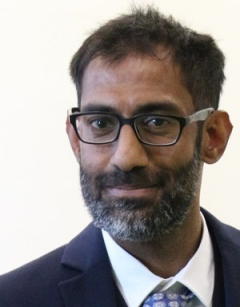
Abdulsamie Patel
Postdoctoral Scholar
What interests you about the topic that you're working on in the lab?
PATEL: The work in Dr. Rexach’s lab has allowed me to develop my cell biology skills and take them to the next level. You can do a million different things with cells. You can grow them in a petri dish, you can grow them as mini brains—you can do so many things. Working in the Rexach Lab allows me to really delve into stem cells and to apply them to a cell-based model of dementia. So far scientists have only been able to put cells in a dish and let them grow like carpet in 2D. It might be exciting visually, but there is not much more to it. Dr. Rexach wants to explore these models in 3D to replicate the human body. So that's where I can take my cell biology interest and explore it further. At the same time, I learned computational biology, and that's what allows for an ideal combination.
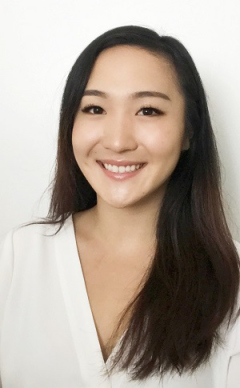
Anna Yin
Staff Research Associate
What interests you about being a part of Dr. Rexach’s lab?
YIN: Dr. Jessica Rexach’s work focuses on the integration of systems biology, bioinformatics, and molecular biology approaches to understand the fundamental pathways and mechanisms involved in neurodegeneration and immune signaling in the brain. There remains much to be understood about the why and how neurodegeneration in dementia occurs as humans age, and I think her work will change how researchers in the future study the progression of disease. This will have significant implications on the future development of therapies for neurodegeneration.
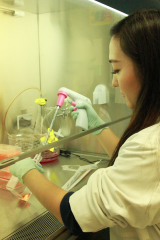
Additionally, her passion for science and her work is evident in her commitment to her team. I appreciate how she encourages collaborative thought and discussion in our lab as well as independent curiosity. Although our lab has members of different education levels, we are able to learn from each other during our weekly lab meetings and through collaborative efforts. Dr. Rexach often takes time out of her busy schedule to reach out to us individually to help us with any research challenges we may have. As a PI and mentor, Dr. Jessica Rexach is dedicated to helping individual members and the lab as a whole grow towards success..
The Rexach team also includes Misty Knight, Meigan Wu, Nathaneal Wijaya, and Caitlyl Limato.